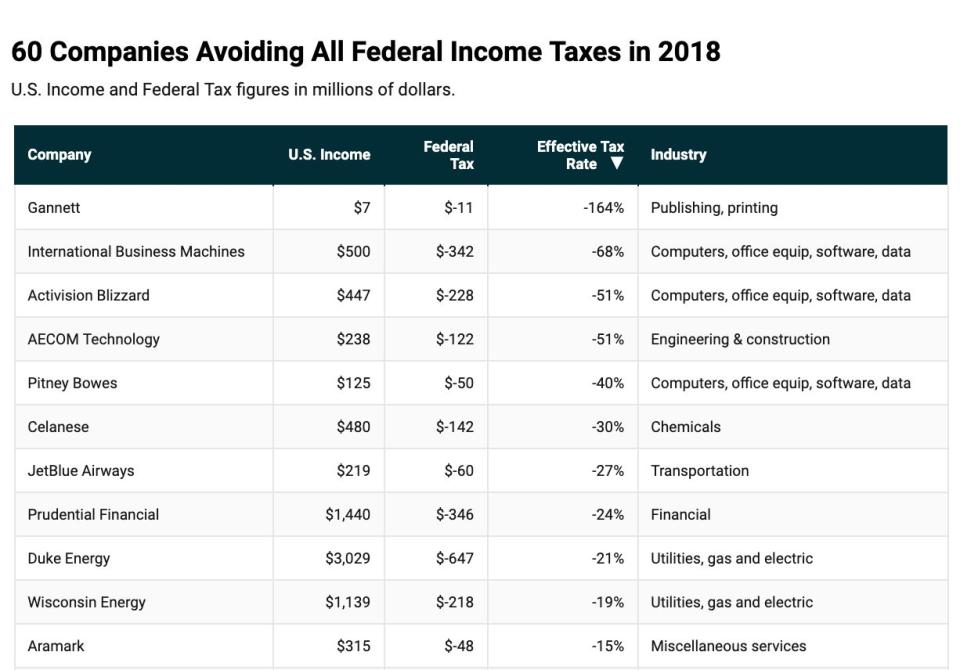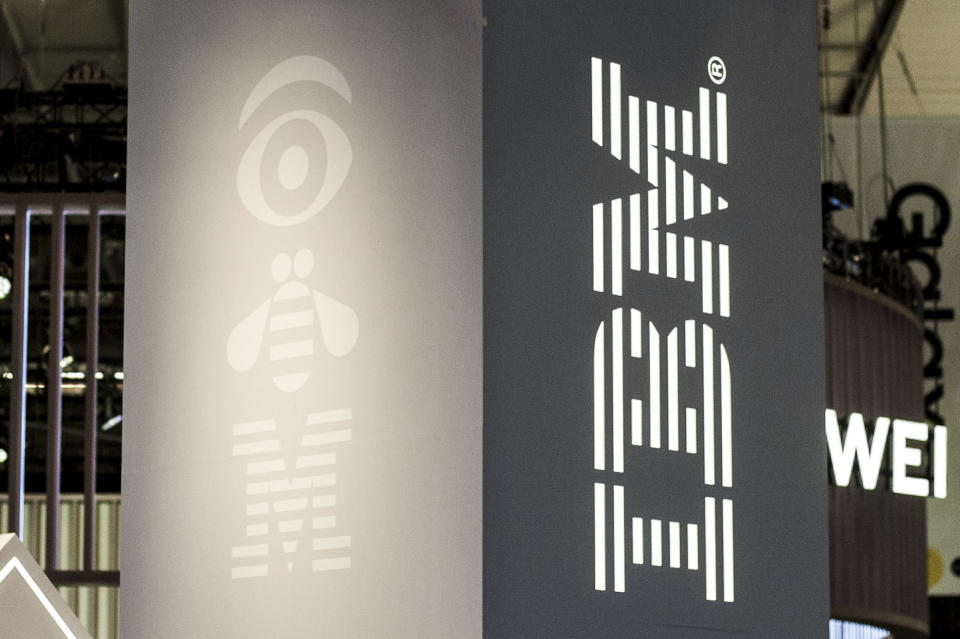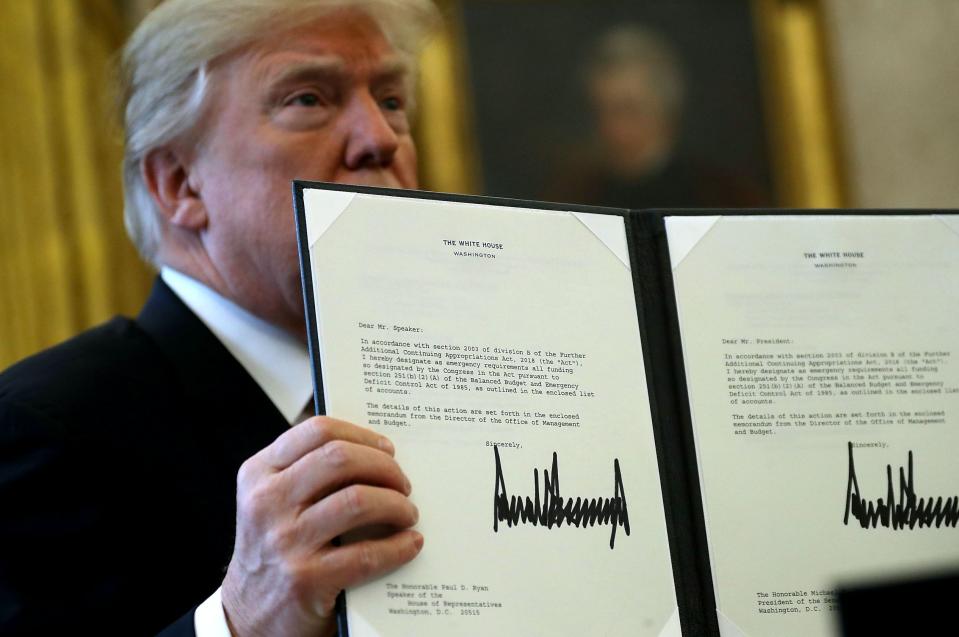9 popular companies that paid $0 in taxes for 2018
A new report reveals that some American companies didn’t just pay no taxes last year — they paid negative taxes.
The report by D.C.-based think tank Institute on Taxation and Economic Policy (ITEP) looked at how Fortune 500 companies have been affected by U.S. President Donald Trump’s 2017 Tax Cuts and Jobs Act (TCJA) and found that 60 of America’s biggest corporations paid $0 in taxes this year.
In other words, instead of having to pay the standard 21% corporate tax rate (which is down from 35% after the new tax law), these companies collectively enjoyed a roughly -5% average effective tax rate from $4.3 billion in rebates.
Notable consumer names on the list include Gannett (GCI), IBM (IBM), Activision Blizzard (ATVI), JetBlue Airways (JBLU), Deere (DE), Delta Air Lines (DAL), Whirlpool (WHR) and Netflix (NFLX). One company that got a lot attention, Amazon (AMZN), brought in the most profit at $11 billion in 2018 and paid an effective tax rate of -1%.
Here’s the top of the list, ranked by effective tax rate:

Gannett biggest beneficiary of relative tax rates
Overall in 2018, corporations paid just 7% of their profits as federal taxes, according to data provided to Yahoo Finance by research firm Oxford Economics. That’s the lowest effective tax rate since at least 1947.
The top beneficiary — in terms of effective tax rate — was media company Gannett. While it only earned $7 million in income in 2018, it also earned tax credits of $11 million, netting a -164% effective tax rate.
The company, which is in the process of evaluating a hostile bid from hedge fund Alden Global Capital, consists of more than 100 daily newspapers, from USA Today to the Detroit Free Press.
Gannett has been granted nearly $19.9 million in state and local tax subsidies over the years — with more than half coming from New York state — according to D.C.-based nonprofit Good Jobs First, which tracks public subsidies to companies.
IBM

Computing giant IBM ranked second with an effective tax rate of -68%. It was followed by Activision Blizzard, infrastructure company AECOM Technology (ACM), and technology company Pitney Bowes (PBI).
IBM has secured a number of subsidies over the years from state and local governments that ring to the tune of $1.4 billion.
The company also has in its pocket federal loans, loan guarantees and bailout assistance at around $5.4 billion. Again, New York gave IBM the most money over the years.
The company came under fire in 2014 after it was reported that it had parked some of its earnings in low-tax countries to boost profits.
After routing almost all its sales in Europe, Middle East, Africa, Asia and some of the Americas through its Netherlands unit, it gradually reduced its tax rate over 20 years — at the same time pretax income quadrupled.
IBM wasn’t the only one playing this game — which at the time was technically legal. Big blue-chips like Apple, Pfizer and Microsoft also stashed trillions offshore to pay higher corporate taxes domestically.
Energy and airlines
Out of all the companies on ITEP’s list, while Duke Energy (DUK) didn’t have the lowest effective tax rate, it got the biggest federal income tax rebate of $6.47 billion.

The Charlotte, North Carolina-based utility giant that operates oil and gas utilities in 7 states, on top of owning nuclear power plants and gas transmissions lines was one of the companies that used accelerated depreciation — where it writes off the cost of their capital investments much sooner than the investments actually wear out — to reduce their tax rates.
Duke also enjoyed $129 million in renewable energy production credits in 2018, according to ITEP.
Interestingly, in January Duke also offered its own rebates to customers who chose to install solar panels on their roofs in North Carolina.
Airlines were also featured heavily further down the rankings. While Alaska (ALK) and Delta (DAL) earned federal tax credits of less than 5%, New York-based carrier JetBlue netted -27% in effective tax.
Stock market darlings Amazon and Netflix also made a cameo, having paid no taxes in 2018. This isn’t the first year that these tech companies are enjoying tax breaks. In an earlier story, we reported that Amazon had also paid $0 in taxes in 2017 as well.

‘Nothing obviously illegal’
“Reducing tax through incentives usually results in corporations doing something good with the money either through CAPEX or hiring or comp or buybacks,” Heritage Capital President Paul Schatz told Yahoo Finance. “And it’s not a one shot deal in one single year. That’s a permanent reduction that plays out over a long period which is supposed to result in better growth for the companies and the economy.”
Kyle Pomerleau of D.C.-based think tank Tax Foundation told Yahoo Finance that going after incentives — something Senator Elizabeth Warren is proposing — wouldn’t necessarily help increase tax revenue, pointing out that there was a nuance in ITEP’s understanding that was missing.
Financial profits — the measure used by ITEP — is meant “for investors to understand how well a company is doing in any given year,” Pomerleau said, but “it is not the same as taxable profits reported to the IRS.”
That means some of these companies getting these rebates sometimes are doing so because they have incurred heavy losses in previous years. Or companies could be utilizing accelerated depreciation — which was introduced as part of the new tax law. And those actions aren’t necessarily intended to deceive.
“The fact that these deductions create a wedge between financial and taxable profits is somewhat irrelevant,” Pomerleau said.

Consequently, according to Pomerleau, reducing incentives in a way Warren proposed wasn’t a fantastic idea.
“In fact, I actually think raising taxes on the rich is more efficient than eliminating expensing for companies,” he said.
ITEP asserted that while “there is, to be clear, nothing obviously illegal about the vague language these companies use to describe their tax provisions... lawmakers interested in enacting true tax reform should critically assess the costs of each of existing tax break — including those discussed in this report — and take steps to ensure that profitable corporations pay their fair share of U.S. taxes.”
Schatz also admitted that out of all the subsidies, perhaps it was time for the U.S. to stop coddling one industry:
“The energy industry is doing just fine as are those corporate behemoths in farming and it’s about time we remove those sector specific tax breaks,” Schatz said. “We should stop picking and choosing winners.”
Aarthi is a writer for Yahoo Finance. Follow her on Twitter @aarthiswami.
Read more:
Amazon will pay $0 in taxes on $11,200,000,000 in profit for 2018
Not just Amazon: 60 big companies paid $0 in taxes under Trump law
Trump tax law 'could put people in financial stress this year'
Follow Yahoo Finance on Twitter, Facebook, Instagram, Flipboard, SmartNews, LinkedIn, YouTube, and reddit.
